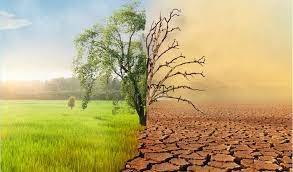Over half of the people in Ghana work in the agricultural industry, which is the foundation of the country's economy. However, it is becoming increasingly clear how climate change is affecting the nation's agricultural output, and this poses a serious threat to both the food security and economic development of the nation.
Weather patterns altering is one of the main impacts of climate change on Ghana's agriculture. The country is enduring extended droughts, which are followed by heavy rains that frequently cause flooding and soil damage. Farmers have struggled to forecast planting and harvesting dates due to the erratic rainfall pattern, which has resulted in decreased yields and crop failure. For instance, in Ghana, the 2015–2016 drought resulted in a 22% decrease in maize production and a 10% decrease in rice production.
Crop growth and productivity are also being hampered by rising temperatures. A shorter growing season, fewer yields, and crops of lower quality might result from higher temperatures. One crop that is particularly sensitive to temperature and precipitation variations is cocoa, which is Ghana's principal agricultural export. According to a study by the International Center for Tropical Agriculture (CIAT), if temperatures continue to rise, cocoa yields in Ghana could decrease by up to 50% by 2050.
Climate change is not just harming crop yields, but it is also having a big influence on farmers' livelihoods. The majority of Ghana's agricultural labor force, which consists of smallholder farmers, is particularly vulnerable to the effects of climate change. As a result of their limited access to the resources and technologies required to lessen the consequences of the changing climate, many farmers are having difficulty adapting to it. For instance, a lot of farmers lack access to irrigation systems, which might lessen the consequences of drought and unreliable rainfall.
Crop output is only one aspect of how climate change is affecting Ghana's agriculture. The livestock business in the nation is also being impacted by changes in rainfall and temperature. Animals that experience heat stress may produce less milk and be more susceptible to illness as a result of higher temperatures. Additionally, there is rising concern over the spread of illnesses like avian influenza and African swine fever, which can have catastrophic consequences for the nation's pig and poultry industries.
The Ghanaian government and international organizations are striving to create plans to assist farmers in adjusting to the consequences of climate change in response to these difficulties. For instance, the government is encouraging the use of drought-tolerant plants and has started a number of initiatives to increase access to irrigation systems and enhance soil management procedures. The World Bank is assisting Ghana in its efforts to adapt to climate change, with a particular emphasis on advancing sustainable agriculture and enhancing the sector's resilience.
To address the effects of climate change on Ghana's agriculture, more work must be done. Policies that encourage sustainable agriculture and the preservation of natural resources are essential, as are resources and technologies that can assist farmers in reducing the effects of climate change. Additionally, there is a need for deeper investigation into the precise impacts of climate change on Ghana's agricultural systems, as well as for the creation of new technology that can aid farmers in adjusting to shifting environmental conditions.
In conclusion, the effects of climate change on Ghana's agriculture present a serious problem that needs to be addressed right away. Millions of smallholder farmers' livelihoods are in danger, and the nation's economy and food security are at stake. Coordinated action from the government, international organizations, and the private sector, as well as a dedication to sustainable agricultural practices that can help to mitigate the effects of climate change and ensure the long-term prosperity of Ghana's agricultural sector are required to address the impact of climate change on the country's agriculture.




No comments yet
Be the first to share your thoughts!